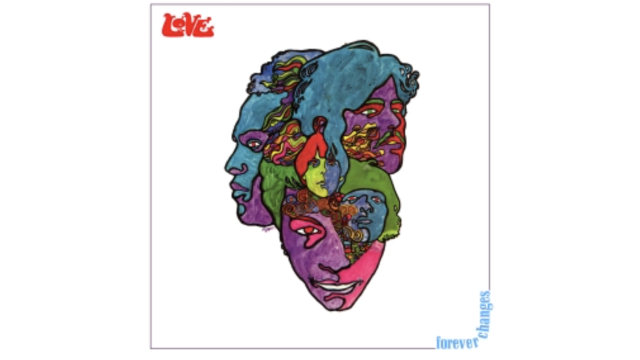In attendance at a 1968 recording session for the Doors, Joan Didion called them “missionaries of apocalyptic sex. Break on through, their lyrics urged . . . .” Released a year earlier, the song Didion quoted the lyrics from, “Break on Through (To the Other Side),” was a radio-ready slab of blues-rock, its mysticism directed downwards at adolescent male libidos everywhere.
In 1967, Arthur Lee, the principle singer/songwriter of Love, was more resigned about the end times. Placed at the end of the first vinyl side of Forever Changes, “The Red Telephone,” a reference to the U.S. communication hotline that was the last-ditch measure to prevent nuclear war with the Soviet Union, began with this chilling statement:
Sitting on the hillside
Watching all the people die
I’ll feel much better on the other side
I can only wonder what Didion would’ve written had she watched the making of Forever Changes. Would she have been as taken by Lee’s feelings about a final release as she was by the anarchic sexual fantasies projected by Jim Morrison of the Doors? Morrison’s barbaric yawp, as Didion chronicles in the title essay of The White Album (1979), resounded through the hip, predominantly-white clubs on the LA strip.
Lee, a black artist in a mixed-race band, was holed up in the Hollywood Hills, composing psychedelic reflections on mortality and loss, conveyed not as much through raging blues-rock riffs as through hazy layers of acoustic guitars and orchestral pop arrangements, which made his despondent thoughts on the state of the world hit harder. The way Lee channels the repressed feelings of the cup-half-full mindset – don’t talk to me about the war; we’re having fun (or are we?)—it feels like a bad trip while listening to an AM station after reading Games People Play.
The album opener, “Alone Again Or,” written by second guitarist Bryan MacLean, gets down to the unescapable reality of desire: you “could be in love with almost everyone.” If “Alone Again Or” expands a moody, flamenco-influenced motif into a breathtaking, widescreen composition, the next song, “A House Is Not A Motel,” beams gritty newsreel footage into your most private spaces. Lee adds a touch of sarcasm that dares you to laugh at the grimness of his prophecy:
More confusions, blood transfusions
The news today will be the movies for tomorrow
And the water’s turned to blood, and if
You don’t think so
Go turn on your tub
And, as Lee predicted, movies would indeed tap into this rather bleak vision. Petulia (1968), juxtaposing TV images of Vietnam with a horrifying, bloody scene of domestic violence, dramatizes how the good times were gone even before the 60s ended.
But Forever Changes looks more critically at the racial undercurrents of the war on the home front. In “The Red Telephone,” Lee moves from his detached view (“Sitting on the hillside/Watching people die”) into the heat of battle at a protest march. As the song fades, a voice riffs on a stereotypical black dialect: “Alla God’s chilluns gotta have dere freedom.”
This, Lee would seem to suggest, is a crucial perception that a band such as the Doors couldn’t open much further: how you could bitterly laugh at being trapped in your own self, your own historical identity. Talk about love/sex, talk about ego-death, or whatever; there isn’t an easy way out. The tension builds up through musical repetition which echoes this theme. In “The Red Telephone,” the chords in the verses feature a dissonant-sounding half-step interval (F to F#). The coda then shifts to a single chord, alternating between the minor and major forms (Am to A).
The mood lifts for the pastoral interlude of “The Good Humor Man He Sees Everything Like This,” yet Lee injects, again, a hint of sarcasm on the “la da das” that tag each verse, as if we’re perhaps in the headspace of a less-aware observer. A disconcerting blast of horns, further intensified by studio effects, suddenly enters, transitioning us to the sneering Dylan-isms of “Bummer in the Summer.” Driven by a raunchy, ascending guitar riff, “Bummer in the Summer” is a concise rocker that sums up Lee’s attitude about buying into the so-called Summer of Love – you’ll be left, in the end, with nothing but disappointment.
Lee’s not done, though, as he saves his most impressionistic song, “You Set the Scene,” for last. The song title points in multiple directions: to the LA scene, which Love, before the Doors, had presided over, and the prelude to a psychedelic experience (what psychologist/psychonaut Timothy Leary popularized as “set and setting”).
The first part of “You Set the Scene” has the angry tone of “Bummer in the Summer,” but then moves to a second part that puts Lee’s contemplative, closing thoughts into an epic arrangement that acts out a world of forever changes. The boisterous fanfare as the record fades, built around a sturdy, two-chord progression (D to G), inverts Lee’s previous claim – “And for every happy hello, there will be good-bye” – producing what sounds like, at the very least, a happier ending. But only if you heed his advice: “They’ll be time for you to start all over,” the initial step, bidding farewell to the LA teenyboppers.
While getting into the Doors has become a quasi-initiatory rite in certain circles, as The Kids in the Hall have drolly observed, listening to Love turns out to be a lesson in subverting 60s-rock cliches. Forever Changes continues to be a provocative work of art, as it dissects the fantasies of a youth-obsessed culture.

